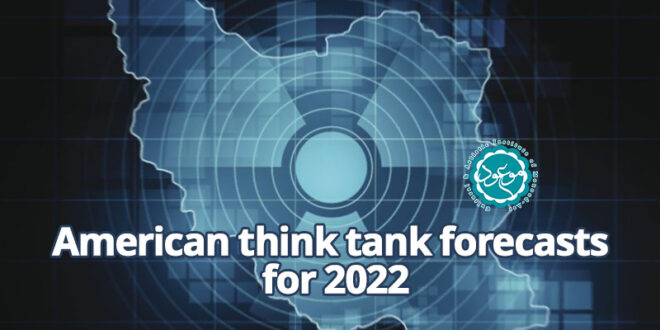Mouood: American think tank forecasts for 2022
From Washington-Tehran limited agreement to escalating tensions between Iran and Israel
The Stratfor Global Information Institute think tank claims that Iran and the United States will reach a limited agreement in the form of forecasts published each year at the beginning of the New Year.
The Mashregh Soft War Service – The Stratfor Institute has published a summary of its 2022 forecasts for the significant effects of geopolitical trends around the world at the beginning of each year. Part of the forecasts is summarized below. The forecasts are in two parts; global trends and regional trends.
“Dear audience, what you read below is merely a translation of selected reports and articles. The content and claims made in this report are published solely to analyze the approaches and views of Western think tanks. Any possible claim and induction of these articles are not approved by us.”

Part One: Global Trends
Global economic growth will remain strong, but it will slow down
The 2022 Global Prediction Report states that global economic growth will continue to be relatively strong and will continue to improve unevenly, but will slow down compared to 2021 due to failures due to the Covid-19 epidemic. The report expects progress and delays in vaccination against Covid-19 in most developed countries. In most of the other countries, there is a potential risk of new species spreading.
The report said that US economic growth will be moderate in 2022, and it is unlikely that the US will be immune to the effects of rising spending on infrastructure until after 2022. The report on China said that restrictions on lending to private construction companies will affect economic growth in general; about 30 percent of China’s gross domestic product comes from investing in real estate and services.

Economic tensions between Washington and Beijing will rise
The slowdown in China’s real estate sector will also affect provincial revenues from land sales and spending levels. As a result, China’s economic growth in 2022 may eventually be below the 6% target for 2021. The report added that reducing the anti-Quid 19 vaccination rate, and its consequences are likely to delay the return of GDP to pre-epidemic levels in many emerging markets and developing countries. The report notes that the omicron and other potential strains may exacerbate supply chain problems and affect all of the world’s economies.
The report also believes that economic tensions between Washington and Beijing will continue to be high in 2022 and that the reason for this, according to the report, is that the United States has restricted China’s access to Western technologies and imposed high tariffs on Chinese goods.
The report expects the government to launch a new investigation – under Article 301 – into China’s industrial subsidies and their use as leverage in trade talks with Beijing. Doing business in China is more complicated for Western companies.

Increasing cyber-motivated attacks around the world
According to the report, financially motivated cyber-attacks will increase rapidly in 2022, especially as criminals increasingly target fifth-generation (5G) devices, cloud computing, and IoT-enabled devices. It will lead to more disruptions and increase new cyber security requirements in Western countries.
Best on the report, US diplomatic pressure against the Kremlin, the law enforcement process to eradicate Russian gangs which are equipped with ransomware, and cyber-attacks against the cybercriminals, will not hinder the growth of the cyber operations, especially those involving ransom issues. The report expects that such attacks will continue to increase in 2022.

Part two: regional trends
The limited nuclear deal between Washington and Tehran
In the other part of the global forecast, Stratfor claims that for the following reasons:
- The serious tendency of the United States and its European allies to slow down.
- Iran’s nuclear developments and Tehran’s strong desire to reduce sanctions and avoid further crises.
May bring the two sides back to the negotiating table. To limit the number of nuclear activities by which Tehran will reduce its nuclear activities in exchange for the sanctions reduction imposed by the United States. The report also noted the possibility of a regional war, particularly between Israel and Iran.
The growing gap between China and Taiwan
Tensions between China and Taiwan are expected to escalate amid growing Western support for Taiwan. But Beijing will not take military action against Taiwan.
Increased cooperation between France and Germany
The Stratfor report highlights the high level of policy cooperation between France and Germany, paving the way for more flexible financial regulation at the EU level. It is to continue to support the energy transition process and adopt a more support-based approach. It paves the way for domestic industries in the field of investment. That will lead to more cohesive political cooperation with Italy and Spain and a comprehensive rotation of the EU to the south of the European continent. The report also believes that progress in the security field will be less.

The Taliban will work hard to stabilize Afghanistan
Stratfor also emphasizes that the Taliban will face severe economic and social pressures in their efforts to consolidate their dominance in Afghanistan. Taliban leaders will have difficulty balancing domestic and foreign expectations as they formulate new rules and formalize a new government and constitutional.
More uncertainty in the regulatory area in China
According to the report, China’s strict regulatory measures will expand to include industries involved in data processing and the provision of basic goods and services. Such exacerbates economic risks, challenges China’s cultural conservatism, and increases global trade uncertainty.

Tensions are rising in eastern Ukraine
Conflicts over the Minsk agreement and Russia’s demands for security guarantees will continue to escalate tensions in eastern Ukraine, as the report said. The report rejects Russia’s attack on Ukraine but believes that Russia will continue to maintain its forces, infrastructure, and equipment near the Ukrainian border in order to put pressure on the West and gain more concessions in the form of security talks in Europe.
In the event of a breakdown in security talks, Russia will attack Ukraine and try to occupy large parts of the country, or launch a limited offensive and launch direct missile strikes against the Ukrainian army to impose a political solution.
It is worth mentioning that the full report of the 2022 global forecasts of the Stratfor think tank will be published early in the New Year.
 Mouood Mouood English Edition
Mouood Mouood English Edition




